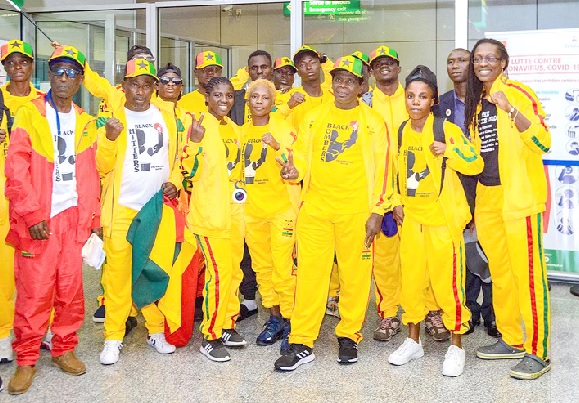
Unleashing boxing’s full potential in Ghana
Ghana's boxing contingent to the just-ended African Olympic qualifying competition in Dakar is expected home today empty-handed after failing to pick a slot for the 2024 Olympic Games in Paris.
Advertisement
The 12 boxers, comprising the Black Bombers and the Black Hitters (national female team), had embarked on their journey with high hopes but they had their Olympic dreams dashed, at least temporarily.
Despite this setback, there are alternative pathways available for seven male and five female boxers to explore in the coming year but the decision to avail themselves for the opportunities at Olympic qualifying competitions in Italy and Thailand ultimately lie with higher authorities.
Already, UK-based boxer Seth Gyimah, also known as Freezy MacBones, has given the indication he would take advantage of the two qualification pathways in a determined bid to pick a qualifying ticket to the Paris Games.
The 33-year-old boxing sensation has a strong management team and financial backing which puts him in a privileged position to chase his dreams relentlessly. And perhaps, the talented Ornella Sathoud, a US-based female boxer and engineer, may also seize those opportunities to continue her pursuit of Olympic glory.
Ghana's performance at the African Olympic qualifiers underscores the current state of amateur boxing in the nation and reflects a broader shift in Ghana's sports landscape. Boxing, once the pride of the nation, has been neglected to the point where it struggles to thrive in the environment it once dominated.
At the Tokyo Summer Olympics, Samuel Takyi's bronze medal win ended a 29-year medal drought for Ghana at the Olympics, and was Africa's sole boxing medal at the event. Takyi's achievement showcased the potential of the sport but unfortunately the country has failed to build on those successes.
Star performer
In its heyday, boxing represented Ghana's best chance for international sporting honours, producing 10 world champions, including legendary figures like David Kotei (DK Poison), Azumah Nelson and Isaac Dogboe.
However, due to neglect from both the state and corporate entitiess, the sport has been left in the hands of passionate individuals who lack the resources to develop it effectively.
One of the glaring issues is the absence of a clear national strategy to harness the abundant boxing talent in Ghana. While Ghana's head trainer, Kwesi Ofori Asare, took a group of talented boxers to the African qualifiers, they faced opponents who were better prepared, highlighting the need for better training and exposure to ensure Ghanaian boxers peak at the right time.
Gone are the days when success seemed almost guaranteed for Ghanaian boxers on the international stage. Today, they grapple with the challenge of even qualifying for international competitions due to inadequate preparation and a lack of a clear development programme.
During Ghana's glorious sporting years, the nation took advantage of bilateral relationships with countries renowned for their sporting traditions and modern infrastructure, such as Cuba, Poland, Hungary, former East Germany and the Soviet Union.
Talented amateur boxers were sent for extended training stints under top coaches in those countries, leading to the production of generations of top-tier boxers who brought honour to Ghana.
Furthermore, coaches from various sporting disciplines were sent for attachments to enhance their technical competence. Unfortunately, many of these pathways, which were cost-effective, have been abandoned despite Ghana's enduring diplomatic, cultural and economic ties with those nations.
Deplorable training centres
The deplorable state of boxing gyms, primarily concentrated in Accra, is a major impediment to the sport's growth. These development centers lack essential equipment, hindering promising athletes from realising their full potential.
Another pressing concern is the shortage of well-trained and certified coaches. Boxing icon Azumah Nelson has pointed to this deficiency as a key reason for Ghana's inability to produce tough boxers capable of international success and seamless transition into the professional ranks.
A former boxer and Vice-President of the Ghana Boxing Authority, Rabon Dodoo, has highlighted the absence of former boxers as trainers, resulting in technical deficiencies among Ghanaian boxers. He emphasised that many trainers lack practical ring experience and the necessary training to effectively coach young talents.
"The problem I see is that most of the trainers we have today were not former boxers, so they don't have practical experience in the ring.
Many of them lack the requisite training and so are unable to effectively train the young boxers," he told the Daily Graphic recently.
It is high time the sport's local governing body in Ghana takes inspiration from the Ghana Football Association which has implemented a coaching development programme at its technical centre at Prampram, a programme designed to raise the standards of football by providing modern coaching courses and a licensure system for coaches at different levels.
Boxing deserves a similar high-level coaching initiative, ensuring that trainers and other personnel in our gyms receive the training necessary for solid grassroots development.
This investment is crucial for the continued growth of Ghana's most successful sporting discipline, even in the face of significant challenges.
The potential of boxing in Ghana remains untapped, and with the right support and commitment, it can once again become a source of pride for the nation.




